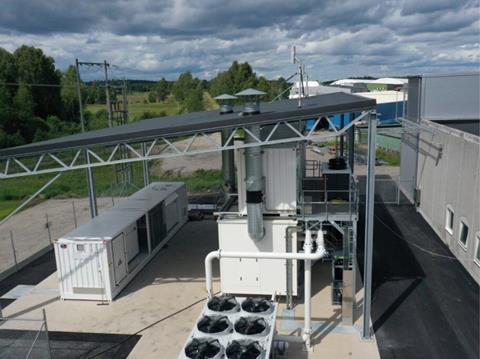
Ardagh Glass Packaging received the Commercialized Climate category award in this year’s Sustainability Awards for its onsite hydrogen electrolyser, said to have reduced its glass bottle carbon emissions by over 14%. We spoke with the company to find out more about this entry.
You’re a winner in the Sustainability Awards 2025. Congratulations! Could you summarize your entry, in less than 50 words?
Ardagh Glass Packaging’s hydrogen electrolyser, powered by renewable electricity, is the world’s first, onsite hydrogen electrolyser for glass packaging production. The hydrogen has replaced 18% of natural gas in the furnace, reducing carbon emissions by over 14% in glass bottles.
Why do you think the judges were impressed with your entry? Tell us about what is innovative about your project and/or about its impact on packaging sustainability.
We believe the judges were impressed with the technical innovation of this project - Ardagh Glass Packaging (AGP) has evolved glassmaking to running a hydrogen electrolyser, creating an onsite, lower-carbon energy supply for long-term, commercial-scale application, proving that it is possible to successfully combust hydrogen in a commercial glass melting process.
While others in the glass industry have conducted small-scale trials using hydrogen, this has to date been done by delivering a limited supply of hydrogen in tankers – which adds transport CO2 and increases the complexity of onsite logistics. Without an on-site supply of hydrogen, commercial-scale production cannot be achieved in practice.
Latest calculations show that replacing 18% of natural gas in the furnace with hydrogen should reduce the carbon content of each glass bottle by over 14% (based on LCA modelling), which is equivalent to 21g CO2 saved per 70cl bottle, and 27g CO2 saved per 1 litre bottle.
Finally, can you tell us about the ongoing development of your project, e.g. how your innovation/initiative has been received by the industry, or what the next steps are in commercialization/product development?
AGP’s hydrogen electrolyser has been directly supporting a global vodka brand to seek to achieve its own CO2 reduction goals by supplying lower-carbon glass packaging. It is a key enabler for CO2 reduction and has the potential to be implemented across the wider glass industry, both on continuously operating and newly rebuilt furnaces.
In the future, AGP aims to explore the integration of this technology with its hybrid NextGen Furnace in Germany, which already achieves a 64% CO2 reduction using 60% renewable electricity. Replacing a portion of the remaining natural gas with hydrogen would further reduce emissions.
In April 2025, a team from AGP shared its findings at Glasstrend in Bilbao and the KTH symposium ‘Industrial Decarbonisation’ panel in Stockholm, showing that hydrogen is a viable and safe solution for glass packaging production. In September 2025, AGP will welcome the Japanese Glass Association to the Limmared facility to learn about the electrolyser and how the hydrogen is supplied to, and combusted in, the furnace.
The project not only demonstrates hydrogen’s potential in decarbonising glass manufacturing but also paves the way for further development of a broader hydrogen infrastructure as an enabler for industry decarbonisation. AGP is actively engaging with UK and European policymakers to advocate for reliable access to a cost-effective supply of lower-carbon hydrogen for high-energy industries.
AGP will feature this project as a case study in ongoing discussions with key customers and a wide range of other stakeholders e.g. at industry conferences, to demonstrate the decarbonisation benefits of this technical innovation.
Next year’s Sustainability Awards will take place during the Sustainable Packaging Summit in Utrecht, Netherlands, 10-12th November 2026. You can find out more here.
If you liked this story, you might also enjoy:
The ultimate guide to the Packaging and Packaging Waste Regulation in 2025
How are the top brands progressing on packaging sustainability?
Everything you need to know about global packaging sustainability regulation in 2025
The key to increasing the use of reusable packaging in supermarkets














No comments yet